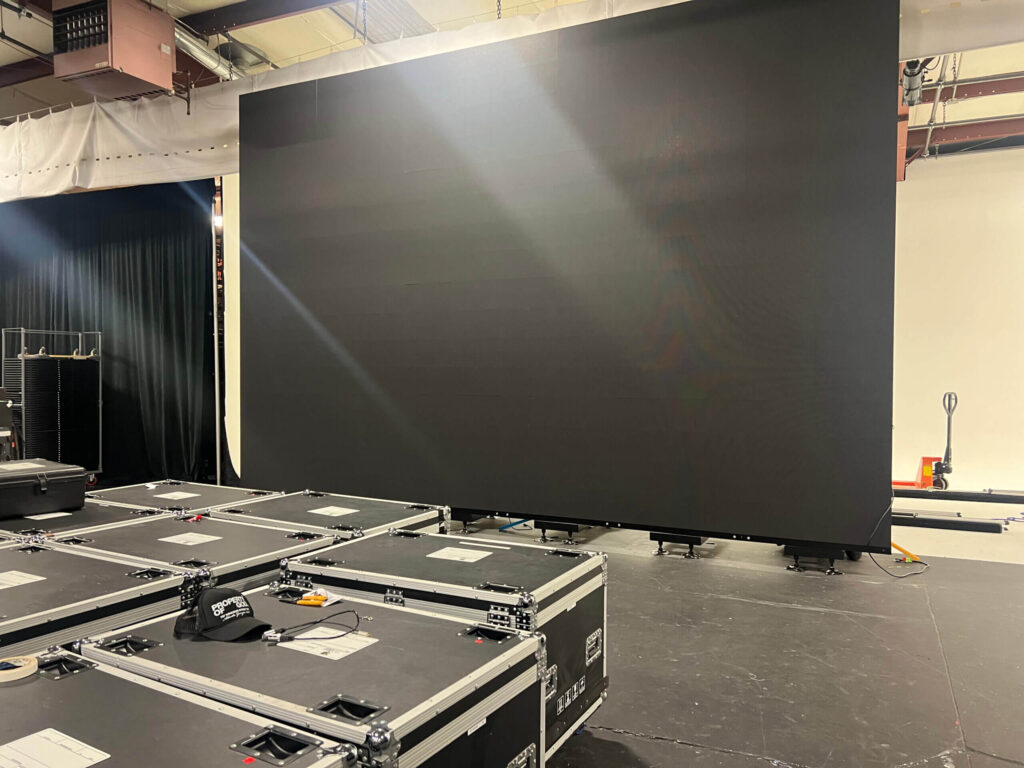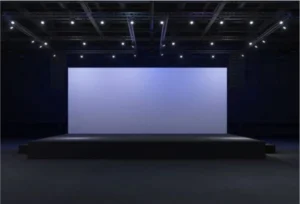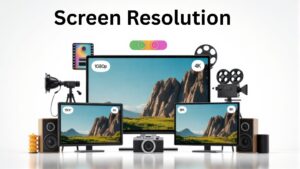Event production is the process of planning, coordinating, and managing all the technical and creative parts of an event. It covers everything behind the scenes, like AV equipment setup, crew coordination AV production for events and on-site technical support. At Huview Productions, we specialize in the audiovisual side of event production, the part that transforms an ordinary event into something unforgettable. From sound and lighting to video and staging, we focus on the elements that engage audiences, support your message, and leave a lasting impression.
Event production isn’t just about planning; it’s about making an event look, sound, and feel amazing. And that only happens with the right AV productions. At Huview Productions, we handle every part of this process with precision.
As a full-service audio visual production company in Atlanta, Huview Productions delivers reliable, high-quality AV services that align with your event goals, whether it’s a corporate conference, virtual trade show, hybrid event or concert production. We bring the tools, team, and expertise to create a seamless experience from start to finish.
This blog post explains why AV production is the heart of every event and what to expect when hiring an event production company. By the end, you’ll know how it works and be ready to plan your next event with confidence.
Why AV Production is at the Heart of Every Event Production?
Every event has moving parts. Schedules, speakers, décor, guests. But the piece that connects all is audiovisual production.
Think about it. What’s the first thing people notice when they walk into a space? The lights. The screens. The sound. These details shape how the event feels. If the microphone cuts out or the stage is too dark, the entire moment falls flat. People stop paying attention. The message gets lost.
AV production does more than support the event, it drives the experience. It controls how people hear, see, and remember what happens. A good audio setup helps every word land. The right lighting draws focus and sets the tone. Video brings in movement and clarity. Stage design creates structure and presence. Together, these elements bring the whole room to life.
And yet, when AV works well, most people don’t notice it. That’s the point. The job of an AV team isn’t to stand out, it’s to make sure the content does. At Huview Productions, this is our role. We handle the background work that makes the foreground shine. From live shows to business events, our AV crews manage sound, lighting, video, and staging so everything runs smoothly.
Understanding Event Production, Event Management, and Event Planning
If you’re new to the event industry, you’ll often hear words like “event production”, “event management”, and “event planning”. While these terms are often used interchangeably, each requires different personnel with a variety of skill sets.
Event production is the implementation and delivery of the physical aspects of an event, including audiovisual, lighting, decor, stages, and props.
Event management is the strategic planning, coordination, and execution of all aspects of an event from start to finish.
On the other hand, event planning is the process of organizing the details and logistics of an event, including concept development, scheduling, and coordination of vendors and activities.
People often think event planning and event production are the same thing. But they are not. They work together, but they focus on different parts of the process. Let’s find out the difference between event production, event management, and event planning.
Event Production
Event production handles the technical and creative elements that shape the guest experience. From setting up stages and sound systems to lighting design and video feeds, the production crew makes the event look and feel impressive.
Here’s what falls under event production:
- Audio and visual equipment setup.
- Lighting design and control.
- Stage construction and layout.
- Special effects and ambiance.
- On-site tech support during the event.
- Live streaming or hybrid solutions.
Event production is all about execution, making sure the speeches are heard, the lighting highlights the right moments, and the event space transforms into something memorable.
What is Event Management?
Event Management is the strategic process of planning, organizing, and executing events such as conferences, concerts, corporate meetings, trade shows, and social gatherings. It involves overseeing logistics, budgeting, vendor coordination, venue selection, scheduling, risk management, and on-site execution to ensure the event meets its goals and delivers a seamless experience for attendees.
Here’s what falls under event management roles:
- Managing and allocating the entire event budget across all departments.
- Securing licenses, insurance, and ensuring the event meets legal, safety, and regulatory standards.
- Coordinating with executives, sponsors, partners, and clients to align the event with business goals.
- Identifying, assessing, and mitigating risks across all phases of the event.
- Gathering feedback, analyzing KPIs, and producing event performance reports.
- Overseeing the full event lifecycle and ensuring coordination between planners, vendors, and production teams.
What is Event Planning?
Event planning focuses on organizing the event from start to finish. Event planners coordinate schedules, book venues, handle guest lists, manage budgets, and communicate with vendors. Think of them as the conductor of the entire process, working behind the scenes to keep everything moving on time.
Here’s what planners typically manage:
- Choosing the date and venue.
- Building timelines.
- Coordinating guest lists and RSVPs.
- Managing vendors (caterers, florists, transportation).
- Creating a theme or concept.
- Staying on budget and keeping everyone on schedule.
- Overseeing contracts and permits.
- Keeping the budget in check.
Basically, they make sure the event has structure. They talk to clients, solve problems, and make sure every piece fits into place like a puzzle.
The Event Production Process: Key Stages Explained
There are 4 stages of event production. They are Pre-production, on-site, show day and loud out.
Stage 1: Pre-Production
Pre-production starts as soon as the event production company is hired. The client and event producer meet to discuss the purpose, goals, and expectations of the event. This is where the producer listens to what the client wants to achieve. Together, they decide on the size, style, and key moments of the event.
Next, the producer creates a clear plan that covers everything needed to bring the event to life. This includes choosing the right equipment, deciding on lighting and sound setups, and figuring out any special needs like video screens or live streaming.
During this stage, the client also finds out about additional services the production company offers. These might be designing graphics, creating video content, or organizing speaker rehearsals. The producer can suggest ideas that will enhance the event experience.
Budget discussions happen here, too. The producer works with the client to match the plan to the budget and makes adjustments as needed.
Finally, the production plan is shared with everyone involved. This plan is like a roadmap; it guides the team through the entire event process. Even if changes happen later, this early work sets a solid foundation for success.
Stage 2: On-Site Production
Once the venue is open and the client has access, the production team arrives to set up. They unload equipment, build the stage if needed, and start placing lights, sound systems, screens, and cameras according to the plan.
Every cable, light, and speaker is set up with care. The team does checks to make sure everything works. They test sound levels, video feeds, and lighting cues. Any problems are fixed before the event starts.
Rehearsals happen during this time, too. Speakers or performers walk through the show while the team runs lights, sound, and visuals behind the scenes. These run-throughs help everyone know what to expect.
While this is happening, other vendors like decorators or caterers may be working too. A good production team knows how to do their job without getting in the way.
Stage 3: Show Day Execution
On the day of the event, the production team arrives early to check everything one more time. They walk through the plan, make sure all equipment is working, and confirm everyone knows their job.
As the event starts, the team manages everything behind the scenes. They control the microphones, lights, screens, music, and any video or live stream feeds. Every cue, sound effect, and camera angle is timed to match the event schedule.
If it’s a live event, they adjust sound levels and lighting based on how the room feels. If there’s a virtual audience, the team monitors the stream to keep the video and audio smooth.
Throughout the event, someone from the production team stays in close contact with the client or event manager. If anything changes or a speaker needs help, they’re ready to step in quickly.
The team also keeps things running on time by following the run-of-show, a detailed schedule of who’s doing what and when. If a speaker runs long or there’s a delay, the team makes fast adjustments without stopping the flow of the event.
Their job during show day is simple: keep everything working, fix problems fast, and help deliver the experience the client planned.
Stage 4: Post-Event Load Out
Once the event is over, the production team starts to take everything down. This is just as important as the setup. All equipment, lights, speakers, cables, cameras, and staging are carefully packed away and removed from the venue.
The team follows a plan to break everything down safely and efficiently. Gear is cleaned, checked for damage, and loaded back into trucks. Nothing is rushed, but everything moves quickly.
The team also makes sure the venue is left in good condition. Trash is picked up, tape is removed from floors, and any borrowed items are returned to their rightful place.
Once everything is loaded out, the client and production company may meet again to review how the event went. This helps both sides learn what worked and what didn’t.
What Does an Event Production Company Do in Atlanta?
An Event Production Company is a specialized agency that designs and transforms event concepts into live experiences by managing the technical, visual, and logistical elements such as staging, lighting, sound, video, and execution, ensuring everything runs smoothly from setup to showtime.
They take care of staging, lighting, audio, video, and all technical elements needed to deliver a seamless and impactful experience. Whether it’s a corporate conference, concert, or live stream, they ensure every detail runs smoothly on-site. Their job is to turn creative ideas into a fully produced event that looks, sounds, and feels professional.
Event Production Services Offered by Expert Companies
Some of the services an event production company provides are:
Staging and Rigging
Event producers handle the setup of stages, trusses, and rigging needed to support lighting, screens, and sound equipment. They make sure everything is stable, safe, and designed to match the event layout. This creates a solid foundation for performances, presentations, and audience visibility.
AV & Audio/Visual Services for Events
They provide all the essential audio and video equipment for your event. This includes AV equipment like microphones, speakers, projectors, screens, and cameras. They manage setup, operation, and troubleshooting to make sure your sound and visuals run smoothly and look professional.
Virtual and Hybrid Event Production Services
Event Production Companies help to plan and run both hybrid and fully virtual events. They handle the live-streaming setup, connect in-person and remote audiences, manage online platforms, and provide technical support throughout the event. This makes it easy to reach a wider audience without losing engagement or quality.
Event Lighting Design and Services
Event production companies design and set up lighting to create the right mood and focus for your event. This includes stage lights, ambient lighting, spotlights, and special effects. They ensure the lighting enhances the experience and highlights key moments perfectly.
Live Streaming and Broadcast Event Services
They set up and manage live streaming to broadcast your event online. They handle cameras, internet connections, and streaming platforms to ensure a smooth, high-quality experience for viewers anywhere in the world.
Event Technical Setup and Configuration
Technical configuration covers the setup of all equipment needed for the event to run smoothly. This includes audio systems, video displays, lighting rigs, stage layouts, and power distribution. It’s about making sure everything is tested, connected, and ready before the event starts. A good event production team handles this in advance, so there are no last-minute surprises.
Types of Events Managed by Event Production Companies.
Event production companies don’t focus on one kind of event; they serve different types of events for different industries and sizes. Whether it’s a corporate meeting or a national conference, they bring the gear, the crew, and the know-how to make it all work. Let’s explore the types of events they typically bring to life.
Corporate Event Production and AV Services
From leadership summits to training sessions, corporate events rely heavily on clear sound, strong visuals, and a smooth schedule. Event production teams handle everything from audio systems and LED displays to stage lighting and livestream feeds. They help brands look polished, stay on message, and connect with their audiences, whether they’re employees, partners, or investors.
Live Events: Concerts and Music Festivals
These shows can’t afford to fall flat, literally or figuratively. Production crews build stages, run sound checks, control lighting rigs, and manage video walls so performers can focus on entertaining. From small club gigs to open-air festivals, they’re the ones making sure the crowd hears every beat and sees every flash of light in sync with the music.
Private Events: Weddings and Celebrations
Every couple wants their wedding to feel memorable and look beautiful in photos. Production professionals handle uplighting, ceremony sound, DJ support, and ambiance lighting. They also help with special effects like fog machines, LED dance floors, or monogram projections, giving personal moments a professional touch.
Charity Events: Fundraisers and Galas
Charity events need more than good food and kind hearts—they need smooth production. These often include silent auctions, guest speakers, live performers, and multimedia presentations. A production team handles all of it, making sure the event impresses donors and supports the cause.
Trade Shows and Product Launches
If you’re unveiling a product or introducing a new service, presentation matters. These events often feature stage demos, screen displays, spotlighting, and sound systems that reach large crowds. A production team can manage lighting, staging, and audio to keep your brand at the forefront.
Virtual and Hybrid Event Production
These are here to stay. Whether fully online or a mix of live and remote, virtual events need solid internet, multiple camera setups, professional sound, and real-time tech support. Production companies now offer solutions for Zoom, YouTube Live, Microsoft Teams, and custom platforms alike.
How to Choose the Best Event Production Company in Atlanta
Here are some key factors to consider while choosing an event production company:
Experience and Expertise in Event Production
Always look for companies with a proven track record in your type of event. Experienced companies can tackle every challenge and always bring innovative solutions.
Client Portfolio and References
Check reviews of past projects and ask for testimonials from clients. A strong portfolio shows the company’s versatility and capability.
Custom Event Production Solutions
Always choose a company that listens to your vision and then offers customization.
Event Equipment and Technology Capabilities
Top-tier companies always invest in the latest high-tech AV and lighting equipment, ensuring high-quality performance and safety.
Transparent Budgeting and Pricing
The best companies always provide you with clear pricing and work within your budget without compromising the quality.
Collaboration and Clear Communication
The key to a successful event is clear communication and collaboration with event production companies. They will involve you in the process, provide every update, and be responsive to feedback.
Logistical Expertise and Capabilities
Check if the company can handle transportation, setups, teardowns, and permits or not, especially for large events or public outdoor events.
Common Event Production Challenges and How to Overcome Them
Event production involves more than booking a space and printing an agenda. It’s a high-stakes coordination of logistics, technology, timing, and people. Mistakes are expensive. Delays cause chain reactions. And poor execution reflects directly on your brand.
Here are the most common challenges in event production and exactly how to deal with each one, step by step.
Venue Limitations and Solutions
Choosing a venue without understanding its limitations is a frequent mistake. Many organizers get attracted by visuals or capacity, but ignore the infrastructure.
Key Problems:
- Insufficient power supply
- No rigging points for lighting or video walls
- Load-in access issues
- Internet bandwidth limitations
- Noise restrictions
What you should do:
Request a technical rider or specs sheet from the venue. Walk the space with your AV team. Ask the venue to confirm ceiling height, loading dock access, electrical capacity, Wi-Fi speed, and safety compliance. If these don’t meet your needs, move on.
Managing Budget Overruns in Event Production
Small missed details multiply into large overspends. Misjudging labor hours, underestimating setup time, or forgetting taxes and delivery fees are common culprits.
Key Problems:
- Hidden labor or overtime costs
- Rush fees for last-minute rentals
- Unbudgeted technical requirements
What you should do:
Itemize every category: audio, lighting, video, décor, crew, permits. Add a 15% contingency line. Confirm vendor rates in writing. Track spending weekly. If you go over in one area, cut from another. Don’t assume the original quote is the final price.
AV and Technical Issues in Event Production
Technology is non-negotiable at events. One bad mic or a projector freeze can ruin an entire session or keynote.
Key Problems:
- Wireless mic interference
- Dead projector bulbs
- Weak live stream signal
- Sound delay or echo
What you should do:
Do a full technical rehearsal with your AV team using the actual equipment. Don’t just test one mic—test them all. Assign a show caller to monitor cues. Bring spares: microphones, HDMI cables, batteries, and adapters. Never rely on venue gear without inspecting it.
Vendor Coordination and Communication Challenges
Vendors showing up at the wrong time or missing key deliverables often result in poor coordination.
Key Problems:
- Inconsistent timelines across vendors
- Verbal-only confirmations
- Lack of shared production plan
What you should do:
Create a production timeline. Distribute it to every vendor. Use a shared drive or project management tool. Confirm everything by email. Have a single point of contact for all vendor communication. Reconfirm 48 hours before the event.
Handling Last-Minute Changes During Events
Unexpected changes can’t be avoided, but how you respond matters. Unprepared teams scramble. Prepared teams adapt.
Key Problems:
- Speaker cancellations
- Equipment issues
- Weather shifts for outdoor events
What you should do:
Build a contingency plan in advance. For outdoor setups, prepare an indoor backup. Create a flexible agenda with filler content if needed. Staff extra crew members to respond quickly. Always have a contact list for backup speakers or vendors.
Time Management and Scheduling Issues in Event Production
If you don’t control timing, the event falls behind. Audiences disengage. Speakers lose stage time. Breaks get cut.
Key Problems:
- Sessions run long
- Transition delays
- Speakers ad-lib without limits
What you should do:
Use a show caller with a cue sheet to keep everything on time. Rehearse speaker transitions. Keep a visible countdown clock backstage. Let your MC or host know when to cut or stretch in real-time. Assign one person to oversee the time for every segment.
Ensuring Safety and Compliance in Event Production
Ignoring safety, fire codes, or insurance requirements exposes your team and attendees to real risks.
Key Problems:
- No first aid or emergency response plan
- Missing fire permits
- Blocked exits or trip hazards
What you should do:
Walk through the site and flag hazards. Tape down all cables. Rent safety signage and barriers if needed. Confirm your insurance covers vendor incidents. Submit permit applications early. Assign someone to monitor crowd movement and access control.
Engaging Your Audience During an Event
Even a perfectly executed event can feel flat if the content doesn’t hold attention or stimulate interaction.
Key Problems:
- Overly long presentations
- One-way communication
- No real-time interaction
What you should do:
Break up content with interactive segments, polls, Q&A, and live voting. Use lighting, video, and music to create energy shifts. Schedule dynamic speakers in key slots. Keep the environment immersive: sound, visuals, lighting, and layout must support the vibe.
Lack of Technical Expertise in Event Teams
Many in-house teams lack experience with AV production. Without trained professionals, mistakes are unavoidable.
Key Problems:
- Poor camera placement
- Audio imbalance
- Wrong lighting angles
What you should do:
Hire experienced production partners. Ask for references and portfolios. Don’t assume a general event planner can manage full AV. Assign separate roles: lighting, audio, video, streaming. Rely on experts for setup and live operation.
Post Event Load Out and Breakdown Challenges
Once the event ends, many teams lose steam. That’s when gear gets damaged, inventory gets lost, and cleanup drags on for hours.
Key Problems:
- No breakdown schedule
- Missing gear inventory
- Staff leaving early
What you should do:
Create a detailed teardown plan. Label all cables, cases, and equipment. Confirm vendor pickup times in writing. Assign someone to oversee the load-out. Review the venue’s post-event checklist before leaving. Document issues immediately while details are fresh.
What is production in event management?
Production in event management refers to the execution of the technical and logistical aspects of an event. It includes managing sound, lighting, video, staging, rigging, and other behind-the-scenes elements. The production ensures everything runs smoothly, on time, and according to the event plan.
Essential Equipment for Event Production
Event production uses equipment like audio mixers, microphones, speakers, lighting rigs, LED walls, projectors, video switchers, cameras, staging platforms, trussing, and control consoles. The setup depends on the event’s size, format, and technical needs.
How Event Production Differs from Management and Planning
Event planning focuses on organizing logistics, event management oversees execution, and event production handles the technical and creative aspects of the event experience.
The Importance of AV Production for Successful Events
AV production ensures clear sound, impactful visuals, and seamless technical integration, which are essential for engaging and successful events.







